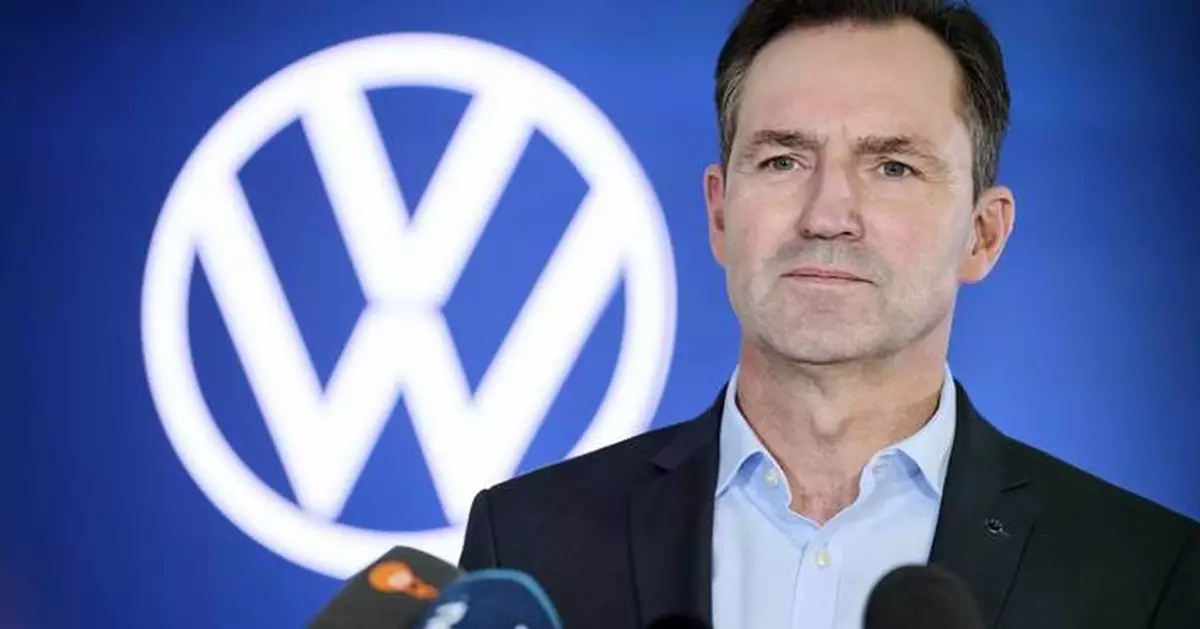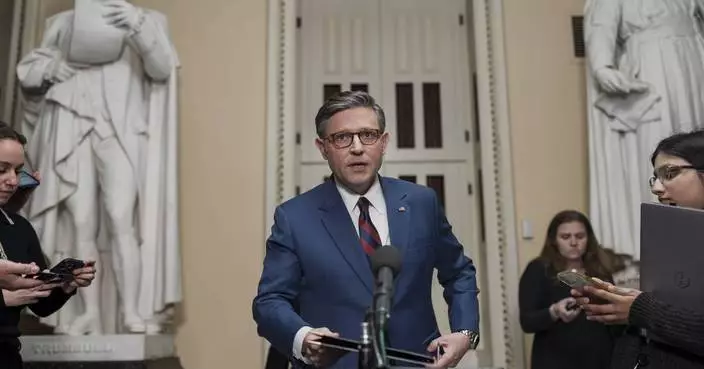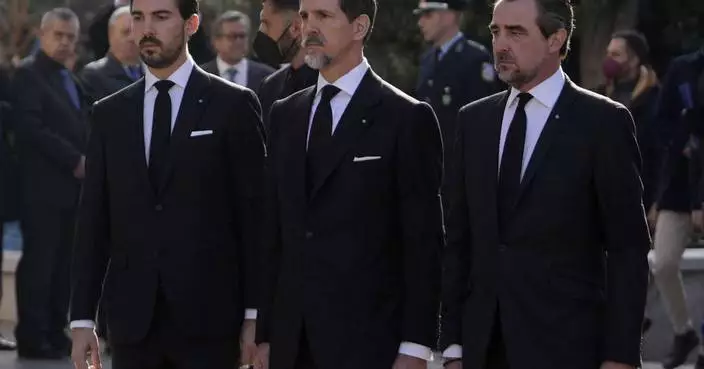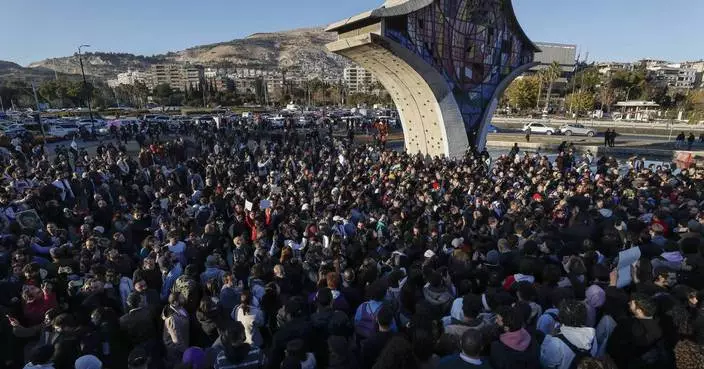FRANKFURT, Germany (AP) — Volkswagen and its employee representatives said Friday they have reached a wage deal for 120,000 German workers that avoids plant closings and bars involuntary layoffs through 2030. The agreement includes provisions for VW to shed more than 35,000 jobs through early retirement and buyouts by 2030.
The deal, reached in drawn-out bargaining sessions that stretched late into the night, is aimed at enabling the Wolfsburg-based carmaker to cope with a drop in demand in Europe, higher raw-material costs and increasing competition from Chinese automakers.
Lagging sales in Europe mean the company has lost potential sales of 500,000 cars a year, or the output of two factories.
The deal would save VW 1.5 billion euros ($1.56 billion) a year in labor costs and 4 billion euros a year by slashing manufacturing capacity by more 700,000 vehicles across its German plants through different production arrangements.
That the agreement avoids wholesale plant closings underscores the role played at Volkswagen by employee representatives and the state of Lower Saxony, who together have majority on the board of directors. That gives workers and the local government unusual leverage.
A top Volkswagen executive called it “a good agreement.”
“We had three priorities in the negotiations: reducing overcapacity in German locations, reducing labor costs and bringing development costs down to a competitive level,” said Thomas Schaefer, head of the company's namesake Volkswagen brand.
“We reached sustainable solutions in all three areas.”
Thorsten Groeger, negotiator for the IG Metall union, said employees also accepted “painful concessions." A union statement said that the loss of bonus payments and other compensation were part of the deal but that monthly wage levels would not be touched. The company had pressed for a 10% wage cut.
Volkswagen argues that it must lower costs in Germany to levels achieved by competitors and by Volkswagen plants in eastern Europe and South America.
Though major plant closings were avoided, a factory in Dresden will cease production at the end of next year as previous planned, and a plant in Osnabrueck is to produce T-Roc SUVs only through the middle of 2027. After those dates, the company will seek other uses for Osnabrueck. Top Volkswagen employee representative Daniela Cavallo said the Dresden plant could be repurposed “also in cooperation with other organizations” that she didn't specify.
The company said it would move production of its Golf model from its home plant at Wolfsburg to Puebla, Mexico, and reduce the assembly lines at Wolfsburg from four to two that would produce the ID.3 and CUPRA Born compact cars. Some 4,000 vehicle development jobs would be dropped at Wolfsburg.

The VW headquarters are pictured, when employees of Germany's largest carmaker Volkswagen went on strike at the main factory in Wolfsburg, Germany, Monday, Dec. 9, 2024. (AP Photo/Martin Meissner)
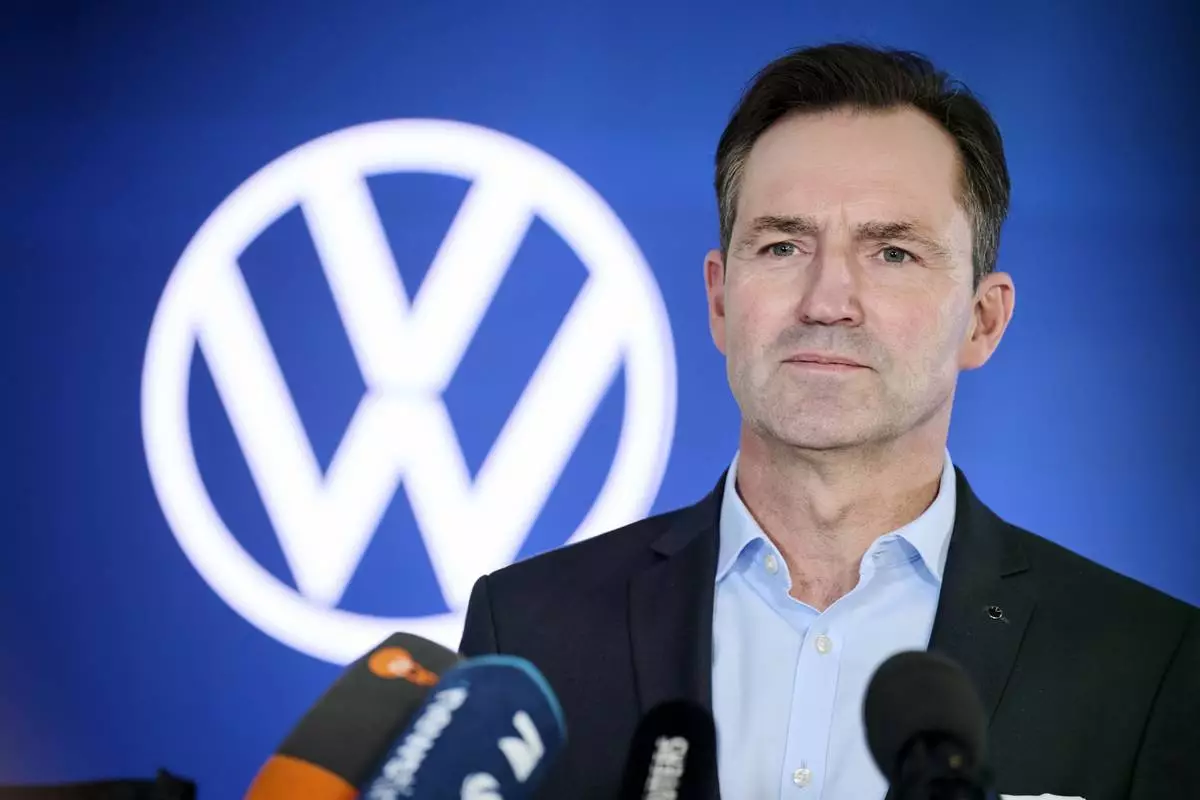
Member of the Board of Management of the Volkswagen brand Thomas Schaefer makes a statement on the wage negotiations at Volkswagen with IG Metall, in Berlin, Germany, Friday Dec. 20, 2024. (Annette Riedl/dpa via AP)
WASHINGTON (AP) — President Joe Biden is abandoning his efforts to provide some protections for transgender student athletes and cancel student loans for more than 38 million Americans, the first steps in an administration-wide plan to jettison pending regulations to prevent President-elect Donald Trump from retooling them to achieve his own aims.
The White House expects to pull back unfinished rules across several agencies if there isn’t enough time to finalize them before Trump takes office. If the proposed regulations were left in their current state, the next administration would be able to rewrite them and advance its agenda more quickly.
Even as the Biden administration moves to pull back the rules, it pushed ahead with cancellation through other avenues on Friday. The Education Department said it was clearing loans for another 55,000 borrowers who reached eligibility through a program known as Public Service Loan Forgiveness, which was created by Congress in 2007 and expanded by the Biden administration.
As the pending Biden regulations are withdrawn, nothing prevents Trump from pursuing his own regulations on the same issues when he returns to the White House, but he would have to start from scratch in a process that can take months or even years.
“This isn’t the way I wanted it to end,” said Melissa Byrne, an activist who has pushed for student debt cancellation. “Unfortunately, this is the most prudent action to take right now.”
She blamed Republicans for putting the Biden administration in this position. “It’s a bummer that we have a GOP that is committed to keeping working-class Americans in debt,” Byrne said.
The withdrawals are beginning as Washington braces for a potential government shutdown that could further complicate efforts by the Biden administration to tie up loose ends.
In documents withdrawing the student loan proposals, the Education Department insisted it has the authority to cancel the debt but sought to focus on other priorities in the administration’s final weeks. It said the administration will focus on helping borrowers get back on track with payments following the coronavirus pandemic, when payments were paused.
“The department at this time intends to commit its limited operational resources to helping at-risk borrowers return to repayment successfully,” the agency wrote.
For the regulation on transgender students, the department said it was withdrawing the proposal because of ongoing litigation over how Title IX, the landmark law preventing sex discrimination, should handle issues of gender identity. In addition, the department said there were 150,000 public comments with a range of feedback, including suggestions for modifications that needed to be considered.
At this point, the department wrote, “We do not intend for a final rule to be issued.”
Kate Shaw, who served in the White House counsel's office under President Barack Obama, said it's more typical for the federal government to race to finalize regulations during a transition period. But “midnight rulemaking” can be difficult when there's a time crunch.
“If you haven’t started it early enough, you’re not going to be able to wrap it up," she said.
An administration official, speaking on the condition of anonymity to discuss internal deliberations, said the administration still supports the goals of its regulatory proposals. However, the process can be lengthy because it requires legal reviews and collecting input from the public.
Federal agencies are now analyzing which rules to finish and which to pull back before the end of Biden's term, the official said.
In recent years, presidents have tended to rely more on executive orders and federal regulations to sidestep gridlock in Congress. However, the rulemaking process can be less durable than legislation, leaving policies more vulnerable to shifts between administrations.
There are dozens of other pending regulations across the Education Department and other agencies, ranging from relatively trivial updates to sweeping policies that carry weighty implications for the nation’s schools and businesses.
If a rule has already gone through a public feedback process under Biden, Trump could simply replace it with his own proposal and move straight to enacting the policy, effectively bypassing the comment period.
The pair of student loan proposals expected to be withdrawn Friday represented Biden’s second attempt at widespread debt cancellation after the Supreme Court rejected his first plan.
One of them is a proposal from April that would have provided targeted debt relief to 30 million Americans. It laid out several categories of borrowers eligible for relief. Borrowers who saw their balances balloon because of interest would have had their accrued interest wiped away. Those who had been repaying loans for 20 years or more would have gotten their loans erased.
That proposal was halted by a federal judge in September after Republican-led states sued, and it remains tangled in a legal battle.
The second rule being withdrawn is a proposal from October that would have allowed the Education Department to cancel loans for people facing various kinds of hardship, including those struggling with steep medical bills or child care costs.
Sen. Bill Cassidy, a Louisiana Republican, said Biden never had the authority to accomplish these plans.
“With today’s latest withdrawal, they are admitting these schemes were nothing more than a dishonest attempt to buy votes by transferring debt onto taxpayers who never went to college or worked to pay off their loans," he said in a statement.
Although Biden did not achieve the sweeping loan cancellations that he initially promised, his administration has forgiven an unprecedented $180 billion in federal student loans through existing programs.
“Because of our actions, millions of people across the country now have the breathing room to start businesses, save for retirement, and pursue life plans they had to put on hold because of the burden of student loan debt,” Biden said in a statement.
On Friday, officials announced they were erasing debt for another 55,000 workers — including teachers, nurses and law enforcement officials — through Public Service Loan Forgiveness. The program promises to cancel loans for borrowers who spend 10 years in government or nonprofit jobs.
The $4.28 billion in relief is expected to be the final round of public service loan forgiveness before Biden leaves office in January.
Biden’s rule on transgender sports was proposed in 2023 but was delayed multiple times. It was supposed to be a follow-up to his broader rule that extended civil rights protections to LGBTQ+ students under Title IX.
The sports rule would have prevented schools from banning transgender athletes outright while allowing limits for certain reasons — for example, if it was a matter of “fairness” in competition or to reduce injury risks.
Biden’s proposal left both sides of the issue asking for more. Advocates for transgender athletes said it didn’t go far enough in protecting transgender students from school policies that could unfairly exclude them. Opponents said it fell short of protecting girls and ensuring fairness.
The regulation sat on the back burner through the presidential campaign as the issue became a subject of Republican outrage. Trump campaigned on a promise to ban transgender athletes, with a promise to “keep men out of women’s sports.”
Had Biden's proposal been finalized, it was certain to face legal challenges from conservatives who said Biden overstepped his authority. Biden’s broader policy on Title IX, which was finalized in April, faced a barrage of legal challenges that prevented it from taking effect in 26 states.
The Associated Press’ education coverage receives financial support from multiple private foundations. AP is solely responsible for all content. Find AP’s standards for working with philanthropies, a list of supporters and funded coverage areas at AP.org.
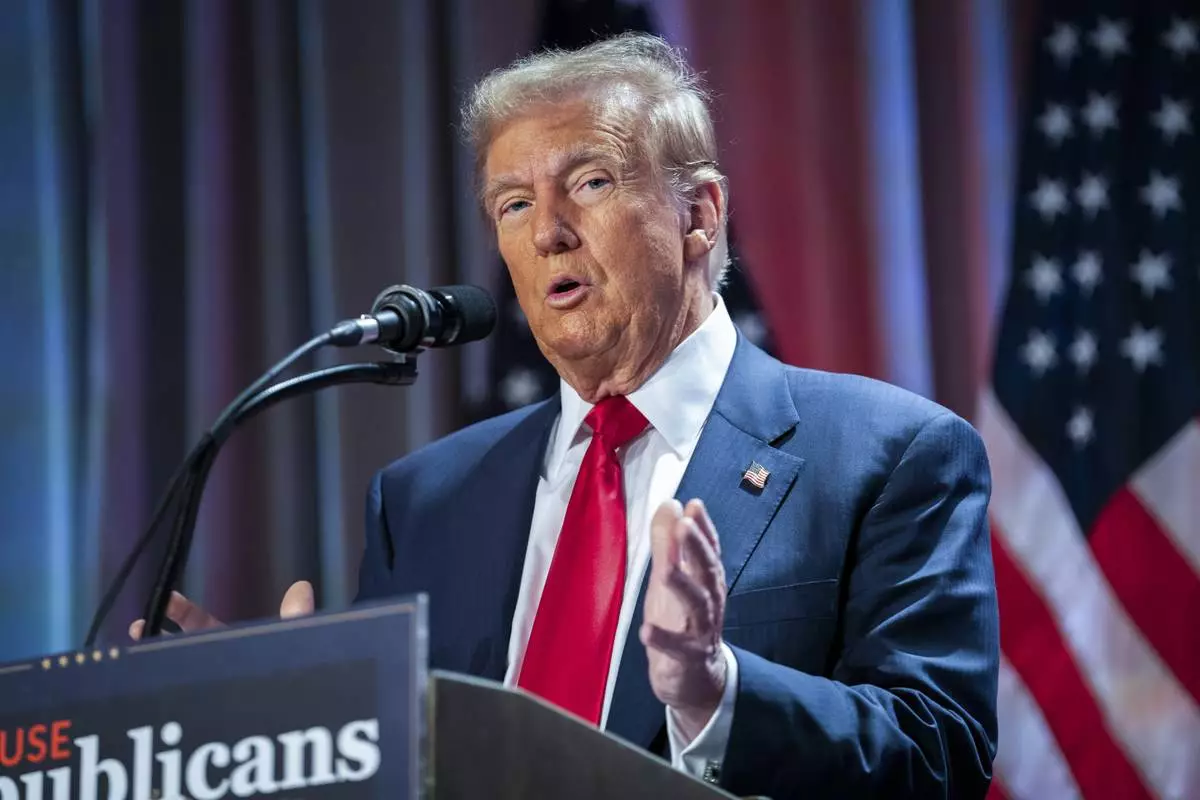
FILE - President-elect Donald Trump speaks during a meeting with the House GOP conference, Nov. 13, 2024, in Washington. (Allison Robbert/Pool Photo via AP, File)
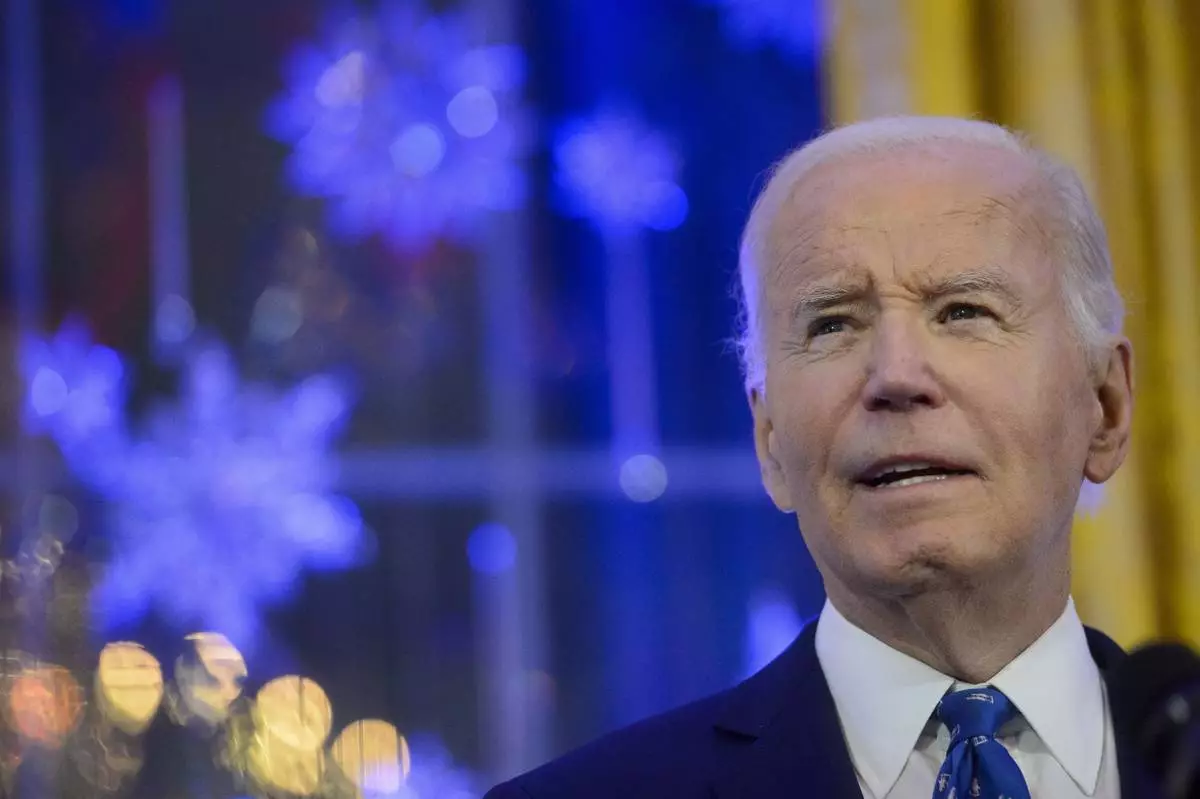
President Joe Biden speaks during a Hanukkah reception in the East Room of the White House in Washington, Monday, Dec. 16, 2024. (AP Photo/Rod Lamkey, Jr.)




